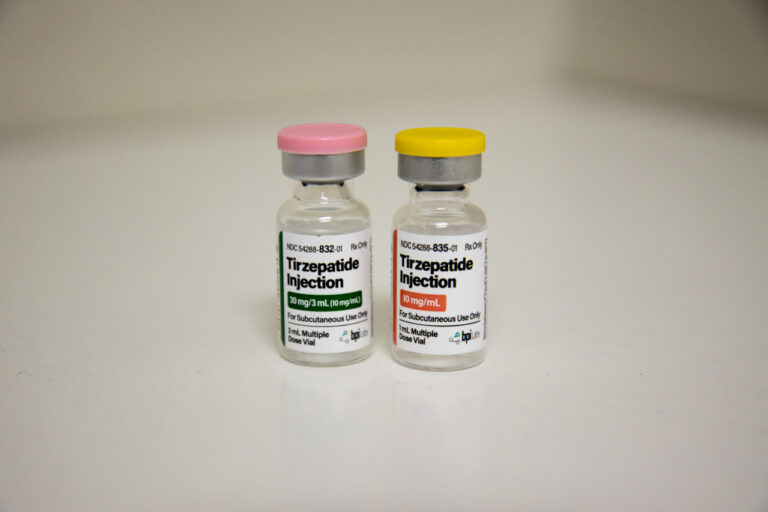
Qsymia: New weight loss medication now available to Denver Residents
 The first new FDA-approved weight loss medication, Qsymia, became available to Denver residents today.
The first new FDA-approved weight loss medication, Qsymia, became available to Denver residents today.
This is huge news for the medical weight loss community! For the first time in over 13 years, individuals needing help with life-long weight control have a new, clinically proven, scientifically valid treatment. Clinical trials lasting 2 years have demonstrated very good weight loss with Qsymia, averaging over 10%, with many patients losing 11 to 14% of their body weight (some lose substantially more than this). This compares favorably with lap band surgery (20%), especially when you consider the significant regain potential after surgery (I’ll review the latest findings on lap band in a future blog article later this month, as reported last week in JAMA). I am hopeful that with treatment, weight loss with Qsymia at 5 years will be greater than weight loss with lap band surgery (this is my hope – only time will tell if it is true).
Qsymia is approved for long-term treatment of weight problems (no time limits are specified), so we will be able to maintain individuals achieving good weight loss with this treatment on Qsymia indefinitely.
Qsymia combines Phentermine and Topiramate in a unique way, capitalizing on the weight loss potential of both drugs, at a dose designed to maximize weight loss and minimize side effects. Nonetheless, we have to be very careful regarding side effects. In particular, Qsymia is NOT safe in pregnancy, so when used in women who have the possibility of becoming pregnant, it will be critical to monitor closely for pregnancy, and to use 1 if not 2 forms of contraception during Qsymia treatment. Also, it can increase heart rate, suicidal thoughts, or be associated with eye problems. Further, Qsymia should not be used by patients on a ketogenic diet (for example, our Protein Sparing Modified Fast program puts patients in to ketosis, and Qsymia used in this meal plan can increase the risk of kidney stones).
While Qsymia is very exciting and we will be prescribing it for patients in the greater Denver metro area immediately, it is important to note a few things. Qsymia is FDA approved only for the treatment of obesity (BMI >= 30), or for patients with a BMI >= 27 with a serious weight-related condition, such as Diabetes, High blood pressure, or High cholesterol. (If you do not know your BMI, please use the BMI calculator in the right column of this post to see if you are a reasonable candidate to be on Qsymia).
In clinical trials, Qsymia did not achieve these impressive weight loss results by itself. In fact, it is intended only to be used as part of a broader lifestyle intervention – i.e., a diet and exercise program needs to be used in conjunction with Qsymia if substantial weight loss is to be expected. In fact, the FDA has approved continuing Qsymia only in cases where significant weight loss is achieved. Patients not successfully achieving weight loss on Qsymia will need to discontinue treatment and pursue other weight loss treatment options.
In addition to weight loss, patients treated with Qsymia were less likely to develop diabetes (or if they had diabetes, had lower blood sugars and could often come off of diabetes medications), and was helpful to patients even if they had experienced difficulties with other weight loss programs.
We expect more treatment options to become available. Belviq, also approved by the FDA last month, is expected to be available in early 2013, and Contrave will have another chance at FDA approval, either in 2013 or 2014. So, stay tuned for more!
If you are interested in discussing whether or not Qsymia would be a good addition to your weight loss program, call Clinical Nutrition Center at 303-750-9454 and set up an office visit with Dr. Lazarus or Heather. We look forward to hearing from you.





Dr. Lazarus, I was just in for a visit and we discussed this med. But thinking it wouldn’t be available for awhile, we added Topiramate (?) to the Tenuate I am already taking. Would there be any advantage in my switching now to the Qsymia or should we see how this combination does? It has been a few weeks and at first I didn’t notice a difference, but the last few days I have seemed less hungry. What do you think?
Debbie – thanks for the comment. Yes, I have many patients interested in Qsymia. Remember Qsymia is a combination with low-dose Phentermine, not Tenuate, so would be different from your treatment. How about if we continue what we started for 1-2 months, then have another visit at the office to see if it is working well, and if not, we can discuss the pros and cons of Qsymia? The office is also trying to get pricing information on the Qsymia, so we can see how it compares cost-wise to the combination you are on.
Please help me. I used to live in Ft. Collins CO. however I now live in the Kansas City, MO. . Do you have a list of Doctors that are qualified to prescribe Qsymia.
Everything I read tell me that only certain Doctors can prescribe, and must be purchased only through mail order pharmacies.
Please help me.
Carolyn Street
660-438-2987 or 785-248-9279
Carolyn: Many weight loss / obesity medicine doctors are members of the American Society of Bariatric Physicians (ASBP). If you go to http://www.ASBP.org, there is a physician locator tab. You should be able to find a local doctor through ASBP. This is correct that Qsymia is available through a REMS (risk evaluation and mitigation strategy) program to reduce the risk of having a baby with cleft lip / palate. So, Doctors must complete a certification, and can then order through mail-in pharmacy. In January or so, we will have another new weight loss medication, Belviq, that obesity medicine doctors can use. I do not believe that Belviq will have the REMS program. If you have trouble finding a doctor through ASBP, you could also try the physician locator tabs at http://www.Optifast.com or http://www.Obesity.org.
Hope this helps.
-Dr. L
Dr. Lazarus
I am obese and have been diagnoise with hypothyrodism I read with qsymia if your are hyper you can not use this. Can I use this product. My husband is station at Buckley.
Thank you
Tracey
Generally yes – patients with hypothyroidism CAN use Qsymia. Hyperthyroidism is a contraindication, hypothyroidism is not a contraindication. With either type, it is important to get good management of the thyroid so that your body is sensing normal thyroid function, so it is worthwhile for me to review your thyroid blood tests with you, and adjust treatment if necessary.
I had lapband four years ago. I noticed the Qsymia capsules are huge!! I am concerned about taking a capsule that size because it may get stuck. Or will it dissolve by the time it gets to the lapband?
Candy: I have not had any patients complain about the Qsymia capsules. They should dissolve and pass without problem. However, if there are problems, plain Phentermine comes in a tiny tablet that can be split, and also a capsule that can be opened and sprinkled on food. It may be that one of these would be a better choice in your situation? I’d be happy to discuss all treatment options with you at the office 🙂
I’m a 26 year old woman, who has struggled with weight my whole life, despite coming from a family that is fit and encouraged healthy eating and exercise. After trying everything and failing everything and over a year under the supervision of an endocrinologist, I’ve been prescribed Qsymia as part of my diet/exercise regime, with the hope of controlling PCOS and other borderline hormonal issues by losing weight. I haven’t started the meds yet and after reading reviews and comments online, I’m hesitant to start! Users have mentioned having severe mental confusion, brain fog, or inability to think/focus. Many complain of noticeable hair loss as a side effect. Between my job and my social life, I’m nervous about this medicine. Should I be worried? How common are these side effects?
Zuby:
The dosage of Phentermine in Qsymia is very low – just 7.5 mg at the recommended dose. We have commonly used Phentermine at 30 or 37.5 mg and very few patients stop due to side effects. In fact, most people feel very good on Phentermine. The Topiramate component of the Qsymia is that part associated with mental confusion, but again that is a small dose – just 46 mg at the recommended dosage. At this dose combined with the time-release placed on the Topiramate, again, I have had very few patient complaints. The idea with Qsymia is to take off a lot of weight with minimal side effects by using these 2 drugs together at low doses. For an individual with a life-long weight problem, there is a choice to make. Either we treat it or we don’t treat it. With Qsymia, should side effects develop, all would go away with discontinuation of the Qsymia.
Really, the comparison should be Qsymia vs Lap Band surgery, a surgery where 40% of individuals regain all the weight. The risks from Qsymia (and the costs) are only a fraction of what a Lap Band costs. I’ll be very interested to see how Qsymia performs in individuals over a 5 year time span, and compare that to Lap Band.
Your 3rd option is to wait for the new weight loss drug, Belviq, due any day now. It appears to have a favorable side effect profile too.
If you are in Denver or nearby, I’d be happy to set up an office visit with you to discuss your question in more detail, and to review lots of other possible medication options.
Thanks for the comment, and good luck finding the best path for you on this, whether or not you choose to pursue the Qsymia.
I have had lap band surgery, lost 80 pounds and over the course of 5 years gained it all back. I began Qsymia in June, I have lost 45 pounds on this medication. I know I could lose more if I would increase my dosage. I am on the 7.5/46 dosage, which is considered a low dose. The side effects of the hair loss are the worst. I am losing clumps and clumps of hair every day. I did not lose hair after the lap band surgery so it cannot be from just the reduction in calories. What can re-mediate this without coming off the medicine? I am afraid all my cravings will come back if I stop taking the Qsymia.
I doubt the hair loss is due to Qsymia; rather, it is likely related to weight loss itself. It is not unusual to go through a cycle of hair loss after a significant weight loss regardless of the method used – Qsymia, Belviq, Phentermine, or surgery. In my experience, with patience, the hair generally comes back. There are all sorts of other causes of hair loss that are not weight-related or Qsymia-related at all. So, it is possible, but the health benefits of a 45 pound weight loss is life-saving. Give the hair some time and hopefully it will come back. Some doctors recommend Biotin supplementation in this situation.
My doctor just prescribed me with Qsymia; but, I am also taking topmax. Is this safe? Will it be more effective?
Betty:
1. I would guess this is safe, assuming maximum safe topiramate dose is not exceeded. I know of no safety studies using the drugs together this way, however,
2. I know of no data that it will improve weight loss.
3. These are great questions – I strongly encourage you to discuss them with the prescribing physician.
I would like to purchase how do I get this product
Hi i’m from calif i have over weight would like a trial pls!
Hello Ana,
Qsymia is a controlled prescription medication. There are no trial or samples of this obesity drug. Consult with your primary doctor or an obesity medicine specialist to see if you are a candidate for Qsymia.
I leave In texas I’m really interest in this pill but I will like know how I could obtain information.
Hello Dayanira,
Qsymia is a prescription medication and you will need to be under medical supervision while you are taking it. Ask your primary doctor about it.
Life changing meds WOW! Would love to try this.
Can I get this in Texas now?
Hello James,
Visit an obesity medicine specialist in your area or perhaps ask your PCP for a referral. Qsymia is a prescription medication and you will need to be under medical supervision while you are taking it.
Can this be ordered thru internet?
Hello Dawn,
Qsymia is a prescription medication so it is only available through a licensed physician. To receive the maximum benefit from Qsymia it should be used in conjunction with a medical weight loss program.
It would be great to have a list of Qsymia trained Physicians throughout the USA. A “map” if you will, to point us in the direction so we could get started. It would be a waste of time picking a Physician at random and then trying to persuade him or her to prescribe Qsymia. Every Physician has their own preferred method of weight loss and will probably be reluctant to prescribe Qsymia and from what i have read, they need special training in order to prescribe anyway. I have seen many questions online about where to find a Doctor that can prescribe this but no answers. I believe this medication will take off quickly and spread rapidly with good results and a lot of happy customers if we only knew where to go. Many PCP’s will not prescribe this (my own included). Any suggestions other than going on line Doctor by Doctor? I appreciate your time. TY!
Hello – this is a great comment. Currently, of the individuals that may benefit from a medication for weight loss (including qsymia, phentermine, saxenda and the others), only 1.6% receive a prescription. And, even though obesity is a chronic medical problem, most people are only given medication for 90 days or less. Most primary care providers do not prescribe the anti-obesity / weight loss prescription medications like Qsymia. The best resources for you would be obesitymedicine.org. Click “find a clinician” and then filter in your area for those that have ABOM certification. ABOM is the American Board of Obesity Medicine. They allow physicians to get certified in obesity medicine / medical weight loss. ABOM would be a second resource.
How can I get prescribed qsymia?
Hi Emily – you are welcome to become my patient! Just call the office at (303) 750-9454 and set up a free visit (in-person / phone / or video) with Erin, our patient advocate, and she can explain all of the options. We often prescribe generic phentermine / generic topiramate (the ingredients of Qsymia) as a cost-effective alternative for people wanting a less expensive option, or Qsymia for people wanting the convenience of one pill a day, and lower side effects from the time-released topiramate. I look forward to meeting you.
Do you take patients that live in Calif. and want to start Qsymia? via telehealth?
Thanks for the question. Sorry, but I am only licensed in Colorado. If you are near the San Francisco area, look up Lydia Alexander…
Do you take patients in dallas Texas and if you don’t please can you kindly refer me to one that does take patients for qsymia.Thank you
Although I trained in Ft Worth, I am no longer licensed in Texas. Try: Andrew Minigutti
MD
West Frisco Health and Wellness
Frisco, TX 75033
Phone: (972) 464-2510
Web Site: http://www.westfrisco.com
Is there anyone in the AR or OK area that prescribes Qsymia?
Sorry not sure – go to the “Find an Obesity Medicine Clinician” tab at obesitymedicine.org – that would be a great place to start. By the way, we often use generic phentermine + generic topiramate for a very similar effect at a much lower cost than brand-name Qsymia.
Qsymia- plus phentermine
Do you have a name and phone number of a doctor in Lexington ky that will prescribe Qsymia
Hi Melanie – thanks for the question about a doctor in Kentucky that can prescribe Qsymia. Unfortunately, I do not know any obesity medicine physicians in that area; however, the Obesity Medicine Association (OMA) maintains a list of board-certified physicians on their web site – go to obesitymedicine.org and in the menu you will see an option “Find a Clinician.” Click that, and search by Kentucky. Alternatively, you can also visit the American Board of Obesity Medicine – their web site is https://www.abom.org/ They also have a find a physician option to find a board-certified obesity medicine (weight loss) doctor. All the best.